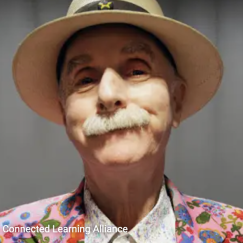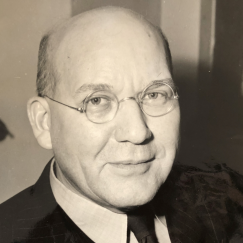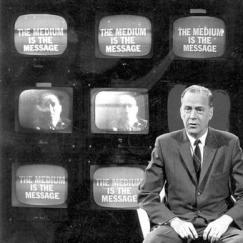The opportunistic teacher who embraces the leisure interests of his pupils in the hope of leading them to higher things is as frequently unsympathetic to the really valuable qualities of popular culture as his colleague who remains resolutely hostile. A true training in discrimination is concerned with pleasure.
Bio/Short Description
Marshall McLuhan was a Canadian professor, philosopher, and public intellectual whose work influenced the practice of media literacy education in the United States and around the world. He was educated at the University of Manitoba and the University of Cambridge and was a Professor of English at the University of Toronto.
McLuhan wrote enigmatic books exploring the changing relationship between people and their media environments. Expressions like "the medium is the message" and the term "global village" emphasized the systemic nature of media influence on people and ideas. In the early 1950s, McLuhan's was asked to write a textbook for high school students about media and society. Instead, he wrote Understanding Media: The Extensions of Man (1964) which examines media as a technological extension of the body.
HOW THEY INFLUENCED YOU?
External Links
Videos
Other Grandparents
 ColinPosted By: Renee HobbsOn:07/13/2025 - 00:50
ColinPosted By: Renee HobbsOn:07/13/2025 - 00:50
 BillPosted By: Renee HobbsOn:06/29/2025 - 20:45
BillPosted By: Renee HobbsOn:06/29/2025 - 20:45
 HowardPosted By: Renee HobbsOn:01/27/2024 - 22:47
HowardPosted By: Renee HobbsOn:01/27/2024 - 22:47
 Gary Posted By: Renee HobbsOn:01/01/2024 - 00:39
Gary Posted By: Renee HobbsOn:01/01/2024 - 00:39
 Clyde Posted By: Renee HobbsOn:04/04/2023 - 18:16
Clyde Posted By: Renee HobbsOn:04/04/2023 - 18:16



Hacer Dolanbay
I think McLuhan is a real educator and thinker. I started to evaluate media literacy from different angles after reading his books.Maybe i can think thanks to his different aspects on states, object and media tools explain. Also he change my mind about media literacy. For example in his 'The Medium is the message' book ı learned that the content to be given is shaped by the means. and his 'Global Village' book video connecting technologies can lead to a kind of psychological death for the entire humanity by separating it from the natural plain the book of nature, by creating a Narcissus like inversion. İn the book of Gutenberg Galaxy I examined the types of literacy that changed from clay tablet to printing press.
jwyatt7
I came to McLuhan in the late1980s while I was in graduate school. At that time, his theories and hypotheses were viewed with trepidation by many in our program. I found The Medium Is the Massage to be a 'game changer.' The ideas were so revealing and flexible. Even more, I loved the wild enthusiasm of the writing and the joy of making connections, small and large. Of course, the digital era has illustrated the ongoing value of engaging with McLuhan and the prescience of his vision. McLuhan taught me so much about medium specificity and engagement. These lessons are powerful to this day.
Jennifer Swift-Kramer
When you see McLuhan on YouTube (check out what he says about being Canadian!), the only clues that he's not live and speaking today are the fact that he's not in color and the odd brand name (Xerox?). He's like the Malcolm X of media literacy. We "read" today the way McLuhan did in his time; it's the only way to survive! The only adaptation I've made is, I start books at the back with the index - using it as a map.
Lance Strate
The experience of suddenly getting McLuhan has been described as akin to a religious experience by some or in more general terms as an epiphany; to use a term popular during the sixties, I was able to grok McLuhan (grok was coined by the science-fiction writer Robert Heinlein in his novel Stranger in a Strange Land to refer to an extreme form of understanding and empathy). In visual terms, it was the kind of experience depicted in comic strips of a light bulb being switched on over a character’s head, which would certainly be fitting, given that McLuhan argued that electric technology and electronic media constituted the basis of a revolution that was reversing the course of some three millennia of Western civilization.
Television was the specific electronic medium that had pushed our culture over the edge, he argued, and one of the characteristics of television was its low resolution image, which McLuhan compared to that of the printed cartoon, which elevated the comics medium in importance (see Scott McCloud’s insightful, McLuhan-inspired graphic nonfiction, Understanding Comics [1993]).
This idea had no small significance for me because I had been reading comics since before I could read (my parents read them to me), despite the fact that the hybrid medium was often disparaged by teachers and others arguing in defense of elitist literary culture. The fact that comics crossed—or, if you like, transgressed—the boundary between literate and pictorial media contributed to my own developing awareness of differences among media, differences in their biases towards different types of content, differences in their effects on the ways we think, feel, act, perceive, and organize ourselves, differences that McLuhan famously summed up by saying, “The medium is the message” (1964, p. 7).
The image of a light bulb turning on is a visual metaphor for an idea (the word is derived from the Greek term for seeing) and perhaps the most basic way of describing the effect of my reading The Medium Is the Massage was that I was suddenly able to see the world from an entirely new perspective (in addition to being a field or intellectual tradition, media ecology has often been referred to as a perspective, although I prefer to use approach in order to avoid the visual metaphor). Or, to invoke Aldous Huxley’s well-known phrase, used to describe his experiments with hallucinogens, the “doors of perception” suddenly opened for me. The reference to perception is particularly significant because McLuhan’s specific approach to media ecology emphasized the primary role that sensory organs play in our thought processes.